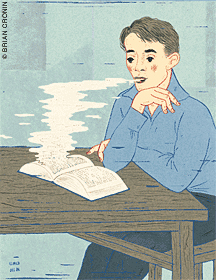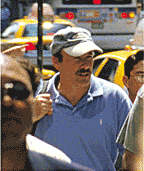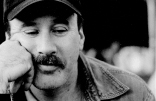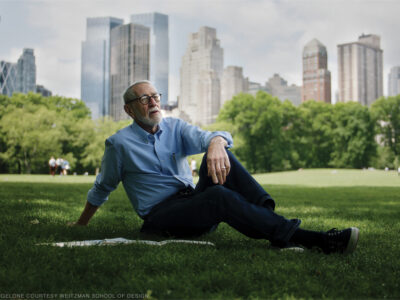
In his acclaimed 2002 documentary, Stone Reader, Mark Moskowitz used his search for the writer of a novel he admired to create a “Huck Finn story for guys who love books.” Now the lost author is back at work, the film is out on DVD, and Moskowitz is leading the fight to revive other forgotten works.
By Holly Love | Illustration by Brian Cronin
It was nearly midnight, and Mark Moskowitz C’76, a producer and director of commercials and promotional films, was having a crisis of confidence as he worked on his first feature-length work, a labor of love called Stone Reader. He phoned fellow-filmmaker Damon Sinclair, whom he had known since they were both disc jockeys at WXPN in 1974, for advice. Sinclair recounts the call with a dead-on impression of a despairing Moskowitz: “Mark says to me, ‘I don’t know what I’m doing. Nobody’s going to watch this. Somebody has to come look at this thing.’” Sinclair immediately drove to Moskowitz’s home studio in Chester Springs, Pennsylvania, to review his film-editing handiwork. “I told him, ‘Mark, this is great. This is one of the best ideas ever.’”
And oh, how the validation has blossomed from there. At the 2002 Slamdance Festival, Stone Reader won both Special Grand Jury Honor and the Audience Award for Best Feature Film, a first for its category of nonfiction narrative. The International Documentary Association nominated the film for its highest honor. Film critic Roger Ebert called it “voluptuous” and presented it at his 2003 Overlooked Film Festival. Other reviewers used phrases like “masterpiece of persuasion and advocacy,” “radiates intelligence and compassion,” and “compulsively watchable.”
Stone Reader is about the love of reading. It resurrects, dissects, and exalts the love of reading. That love has defined Mark Moskowitz from boyhood days when he went nowhere without a paperback, to English studies and student employment at Van Pelt library and the Penn Book Center, to his present day habit of reading half-a-dozen books, mostly novels, concurrently. While for some people, books are merely neglected ghosts of the den, for Moskowitz they are oxygen, extensions of his anatomy, more real than reality. In one of Stone Reader’s most moving sequences, he reflects on the tears he shed over Catch-22 author Joseph Heller’s death in 1999, explaining that the voice behind the pages was a friend he thought he could never find in life.
“I started out thinking it would be a short piece for TV maybe, then maybe a short film, or a TV series, and eventually I decided it was worth the commitment of turning it into an independent feature,” says Moskowitz of the film, which he produced over a period of three years and financed by starting a new company, JETFilms. “All my life I’d made friends based on our liking the same books. I believed there’d be an audience of people who were avid enough readers that they’d be interested in a film that raised the same questions that I also wanted insight into. Like, what is the true value of reading? Has my reading all these books over the years been a waste of time? Is reading just a way of being with other people without putting yourself at risk? How much are you actively co-creating with the author when you read? In the film, people articulate things for me about reading that I always sensed but could never verbalize.”
The impact of one particular novel on Moskowitz provided the framework for his 128-minute magnum opus. In 1972, he read a New York Times review of a coming-of-age novel called The Stones of Summer. The reviewer conveyed nothing short of worship for the work, calling it a “marvelous achievement” by a superior new talent, a “holy book.” But at 18, Moskowitz was unable to get through the 552-page book; he recognizes now that it created “a place I wouldn’t learn how to measure until I was a generation older.” Twenty-five years later, he picked up his old worn-out paperback copy and read the whole thing, and this time the book represented a place that he didn’t want to leave. So he searched for more works by the author, Dow Mossman. To his amazement, he found none—nor could he discover any trace of the author himself. Short of death, what could be the reason such a gifted writer never published another word?
The mystery so haunted Moskowitz that he embarked on a quest to solve it—by searching for Mossman. That search is the river that Moskowitz navigates in Stone Reader in order to reach tributaries of homage to the written word. The film’s co-editor Kathy Soulliere says, “It’s like a Huck Finn story for guys who love books.” Viewers see Moskowitz travel the country to interview those who might shed light on Mossman’s whereabouts. And while he has their attention, he also asks them to shed light on bibliophilic culture, great works of fiction, and other one-book wonders such as Gone with the Wind author Margaret Mitchell and To Kill a Mockingbird author Harper Lee. He meets with literati like Frank Conroy, the head of the University of Iowa Writers’ Workshop (which Mossman attended); literary critic Leslie Fiedler; Catch-22 editor Robert Gottlieb; the writer of the Times review, John Seelye; Mossman’s agent; even the book-jacket designer for The Stones of Summer.
And yet, though the experts do a fine enough job on their own of poeticizing reading and artistic invention, Moskowitz doesn’t remain behind the scenes. It was an exceptionally rare and chancy approach for a documentary maker: He not only made himself Stone Reader’s main character—he made himself, with acute aptness, an open book. Throughout the documentation of his quest, Moskowitz weaves Moskowitz. He reveals the parallel march of his life—we see his son expectantly receive his next Harry Potter book; we’re there when his father dies—and we get to know the filmmaker through his soul-baring, first-person narration describing his enthrallment with literature and with the fate of its creators.
“The fallacy is that a documentary is more credible when the interviewer leaves himself out of it,” Moskowitz says. “But I didn’t set out to be Ken Burns or Bill Moyers. I put myself in the film for you to understand where I’m coming from, with all my flaws, so you can decide whether to buy into it or not. Think of writers who let you feel the filter of their consciousness.” Like Michael Moore’s Bowling for Columbine and Ross McElwee’s groundbreaking Sherman’s March, Moskowitz’s film may warrant redefining “documentary.” In the meantime, several reviewers dubbed the film a page-turner, which is especially sweet praise given that Moskowitz once aspired to write books himself.
It was in the classrooms of Bennett Hall that Moskowitz developed a reverence for former Penn English professor Don Graham—to whom Stone Reader is dedicated. “He was never a deconstructionist, overemphasizing the importance of the symbolism in classic literature—or the importance of reading classics at all,” says Moskowitz. “I remember one day, he’s reading to the class, and everybody’s falling asleep. So he says, ‘Do you want to hear this? Me neither,’ and he closes the book. He only wanted to know if a book worked for you—not what it ‘means.’ That approach turns more kids off to reading. He always handed me the right book at the right time, in a quiet way.”
Moskowitz favored the quiet way as a kid, according to his sister, Susan Moskowitz Goldman C’83. “He never shared anything about himself, and always kept his bedroom door locked. Behind it was this growing, phenomenal library. When he left for college, and I finally got to go in there, it was like entering the inner sanctum. I got to discover every Kurt Vonnegut novel, the science fiction, everything, shelf by shelf. That was the first time I ever felt like I truly got to know my brother—through the books he loved. The second time I felt that way was right after seeing Stone Reader.” In every way, the art of storytelling proves to be her brother’s favorite vehicle for connecting with other people. In the film, he meets with John Seelye, who had declared Dow Mossman’s genius superior to William Faulkner’s. “I hit it off with Seelye from the first minute I saw him,” Moskowitz says. “Why? Because we both loved The Stones of Summer.”
At Haverford College’s library, Moskowitz is ready to get down to work on a promotional film for the school. The people he’s scheduled to interview are late, and he has already finished charming the morning sun that floods the stacks into lighting his settings just right. An impressive spread of complimentary pastries does nothing to moderate his impatience, but predictably, the volumes surrounding him do. “I’ll go read some books while I’m waiting,” says Moskowitz. “That’s the best part of being here.” The baseball cap he’s wearing makes him look even more like a kid in a candy shop as he grabs a selection that he started reading during previous engagements at the library. “I’ve read a third of this by now,” he says, holding up the memoir by hard-living jazz-musician-turned-painter Larry Rivers, What Did I Do?: The Unauthorized Autobiography of Larry Rivers. He reads aloud passages of essays from The Sociology of Art and Literature.

Next he peruses the books recommended by Haverford’s Class of 2007 for 2003, while making recommendations of his own to one of his film crew members. “The Woman in White by Wilkie Collins is a great read. Oh, Sleeping Arrangements by Laura Cunningham. Did you read that?” Don DeLillo, White Noise. Alan Furst, Night Soldiers. Janet Hobhouse, The Furies. His addiction to books is surpassed only by his addiction to communing with other junkies.
But when his first film interviewee shows up, he must take off the baseball cap and put on the headphones. Moskowitz warms up his subject by asking him friendly questions, and at some indiscernible point, begins filming footage. Exactly when he throws the switch from making small talk to prompting the man for film-worthy pronouncements is anyone’s guess.
For 24 years it has been Moskowitz’s job to put people’s most compelling moments on celluloid. In addition to institutional films, he has produced television commercials for more than 600 Democratic political candidates, including former Philadelphia Mayor Wilson Goode, former mayor and current Pennsylvania governor Ed Rendell C’65 Hon’00, and former vice president and 2000 presidential candidate Al Gore. “It’s not that I was always interested in politics. I was apathetic and soured on the system,” Moskowitz says. “I got into political ads strictly as a directorial challenge. I’d already done ads for tractors. With political ads, marketing concepts instead of objects means we’re changing the way people think. We’re telling a nonfiction story.”
By “we,” Moskowitz means Point of View Productions, the company he started with Robert Ellis. Ellis is now a bestselling author whose second novel, The Dead Room, is set at Penn. He appears in a Stone Reader scene in which Moskowitz wonders why academics ever made such a big deal over Ernest Hemingway’s The Old Man and the Sea, which he considers, like all classics, to be no more worthy of reading than books students choose themselves. “When Mark and I work on political ads together,” says Ellis, “we suit up and go into the war.”
Moskowitz’s arsenal for campaigners includes both positive and negative ads. “I don’t prefer doing one kind over the other,” he says. “That would be like preferring a running play over a passing play in football. I don’t care. It’s whatever wins the game.”
Many attest that Moskowitz helped pioneer political-ad making. Sinclair, who produces national commercials, says, “In the 1970s, political commercials were more visually and editorially primitive. In old ads, a politician might have just been standing in front of City Hall asking for votes,” he says. “Mark was one of the first to really take advantage of the subliminal power of different settings, of lighting a candidate at a conference table like he might be lit in a feature film, for example. In a sense he figured out how to glamorize candidates for greater appeal. Now his methods are copied widely.”
Moskowitz says, “I think we helped define the form and were often ahead of the curve because we started doing this from the beginning of the political-ad explosion around 1980.” Before then, the majority of congressional clients, which are now the bulk of the political-ad business, didn’t use TV to advertise. Computerized polling helped change that, and it’s polling that allowed TV to have great impact by targeting audiences with messages condensed into 30 seconds—an impact that could be tracked and proven effective. One of the first commercials he ever made taught voters in Philadelphia how to split the ticket to avoid electing Michael “Ozzie” Myers, who remained on the ballot even after being expelled from Congress for accepting bribes during the ABSCAM scandal.
All in a day’s work, Moskowitz chooses track record for a voiceover because focus-group members preferred it over experience. He films a powerful incumbent in a cornfield to make him more accessible, and matches the demographics of the adoring on-screen constituents to those of the ad’s target audience. And he keeps his camera on the pulse of society’s predilections. “In the 1980s, we had to steer away from suggestions of a female candidate’s femininity or motherhood,” he says. “Now, femininity and motherhood sell.” He even helps candidates define their positions. “Sometimes they have no visions, or they don’t know how issues play to the electorate,” Moskowitz says. That wasn’t a problem with Al Gore. “He was in his thirties when I worked with him. Super-smart guy who knew his stuff cold. He wasn’t great at working in the team way that’s required, but he got better as we went along. Candidates often think the campaign works for them, when it’s really the other way around.”
To turn shots into spots, Moskowitz sits at double monitors using “Speed Razor” software to order frames, overlay text, insert jump cuts. He started using digital tools in his work the minute they became available (and ironically, such tools helped him assemble Stone Reader, which addresses the demise of the novel in the digital age). Luckily, the cutting-room floor is in cyberspace, because much of the actual floor is already covered with videos, other work materials, and his overprotective beagle.
Those close to him repeatedly cite how Moskowitz’s ability to focus on the creative process seems to thrive, paradoxically, in the company of chaotic surroundings and a mind spinning in 20 directions at once. “Mark doesn’t care what’s around him. Nothing gets in the way of what he wants to do,” says John Diliberto C’76, a music consultant for Stone Reader and host of Echoes, a music show heard nightly on WXPN.
Moskowitz acknowledges the tremendous help he receives to make it through 30-hour editing sessions and more. Freelance producer Jessica Shamash, who says she’s known Moskowitz “long enough to know where he’s left bits of his brain,” pieces together his schedule—one day he’s off to New York to get footage of a baseball game to run during a filmed interview with a Red Sox executive, the next he’s flying to England to premiere Stone Reader at an international documentary festival. Then there’s the support that comes from his wife, Clare Quinn C’76. She has to admit that the hubbub over Stone Reader has made her feel like a single parent of the couple’s three children. “Mark will tell me, ‘It’ll be over in a couple of months,’ but it’s never over,” she says. Still, she’s behind his making another movie. “He needs to do work that’s artistically meaningful to him. There’s no project I’d ever ask him not to do.”
Another endeavor of her husband’s is the nonprofit organization Lost Books Club, which he founded with donations while finishing Stone Reader in 2001, to bring back out-of-print and under-appreciated books. “People send me books, even manuscripts, with notes like, ‘Look what my father wrote; it was buried for 50 years,’” says Moskowitz. “With everything you find, someone has probably read it and loved it.” The first out-of-print book the club sought to reintroduce was, naturally, The Stones of Summer, originally published by the now-defunct Bobbs-Merrill. Last October, Barnes and Noble republished the novel. After company CEO Steve Riggio saw Stone Reader, he bought a rare copy of The Stones of Summer on e-Bay, paying, thanks to the cult status conferred by the movie, $1,775. “It’s a complex and challenging book, and immensely satisfying,” says Riggio. “After only one month, we sold over 10,000 copies, which is phenomenal.” But he defers to Moskowitz’s influence when it comes to putting books into people’s hands. “When I first met Mark, I said, ‘I’m happy to meet the greatest bookseller in the world.’”
Because Stone Reader is not about what books speak to people, but how and why they speak to people, viewers learn nothing about The Stones of Summer. And prospective viewers might want to stop reading now if they also don’t want to know if Moskowitz ever found its elusive author, Dow Mossman.
In the brogue of William Cotter Murray, novelist and longtime professor at the Iowa Writers’ Workshop, Moskowitz finally hears the words that lead him to his Holy Grail. In what may be considered Stone Reader’s denouement, which follows 75 prior minutes dappled with dead ends, the filmmaker asks the professor if he has ever guided anyone through writing a novel?

“Yes,” Murray answers, and adds with a laugh, “I guided him to a psychiatric ward! … The book was called The Stones of Summer.’” Moskowitz calls the last phone number Murray has for Mossman, and the person who answers gives him the author’s current phone number. Moskowitz dials again and reaches Mossman, who, the very next day, greets the film crew at his front door.
Behind it is an eccentric man. A man who, after writing The Stones of Summer, worked as a welder for 19 years and later bundled newspapers for about six bucks an hour. Mossman mentions his hospitalization for acute anxiety, his failed marriage, and the parental caretaking responsibilities that helped keep him from ever publishing again. But much of what he talks about in his book-swollen house is Shakespeare, Twain, Hemingway, Fitzgerald.
“Dow turned all his creativity away from writing into reading,” Moskowitz hypothesizes now. Reading fit very well into the author’s anachronistic lifestyle. “He was like the man from 1972 who comes to the 21st century,” says Moskowitz. “He didn’t have an answering machine, computer, cell phone, or even a car radio.”
Little did Mossman know that Moskowitz’s mission would eventually land him on NBC’s Today show. “I don’t know how Mark got me in front of the camera, but I ended up feeling totally at ease,” he says. “He also got me writing again, got me back to the typewriter—to a computer, actually. The rest is up to me.”
Last fall, Mossman went on a national book tour, discussing reading and writing and signing copies of The Stones of Summer. At Barnes and Noble in Bryn Mawr, Pennsylvania, wearing work boots looking very much like the ones he wears in Stone Reader, Mossman confirmed that what he most deeply appreciates about books is the same as it is for Moskowitz. “Mark told me that my book has so many stories in it,” Mossman told a hundred listeners. “I think that must be the highest compliment you could ever give a writer.”
Moskowitz says he has less regret now than he had before doing the film that he didn’t become a novelist. “I would never have had the patience, and there’s no collaboration. I enjoy that about filmmaking.” So what’s next? “I had thought about doing something on the correlation between how happy and successful people are and how much they read, and what they read,” he says. “I would have tried to uncover whether reading physically magnifies your creativity, whether it helps you.” He does have another project in the works, but prefers not to divulge details. Soulliere says, “If I had to guess, I’d say Mark’s next film is going to be something about art, or music, or some other creative realm.”
A month after releasing the first Stone ReaderDVD last October, Moskowitz released a three-disc Limited Edition DVD (limited, that is, to 4,000 copies sold only through www.stonereader.net), with extras including deleted scenes, old photos and letters of Mossman’s, and book lists for readers. The third and final unlimited two-disc Special Edition is due in stores in February. On the day last fall when Moskowitz sat preparing DVD footage of himself and a cigar-chewing Dow Mossman on stage with Roger Ebert, he seemed content enough to make a living achieving remarkable things through filmmaking and to connect with the pages of someone else’s imagination only in his free time. After all, he still isn’t sure if escaping to the sanctuary of fiction is mostly indulgent folly or noble pursuit. Either way, whatever he’s accomplished and however much acclaim he’s received, the thought remains in the back of his mind: “All this time, I could have been reading books.”
Holly Love EAS’85 lives in Havertown, Pennsylvania, and is a freelance writer for magazines and newspapers. She can be reached at [email protected].




